Human Right to Housing: A Comparative Study of UK and South Africa
VerifiedAdded on 2022/11/15
|13
|3304
|450
Essay
AI Summary
This essay delves into the human right to housing, exploring its definition, historical origins, and international recognition. It examines the role of the United Nations Human Settlements Programme (UN-Habitat) in promoting and protecting this right, including its strengths, weaknesses, and impact on various nations. The essay provides a comparative analysis of the human right to housing in the United Kingdom and South Africa, evaluating the legal frameworks, challenges, and successes in ensuring adequate housing for all citizens. Key aspects such as security of tenure, affordability, accessibility, habitability, and cultural adequacy are analyzed. The comparative study includes strengths and weaknesses of housing policies in both countries, and the essay concludes with an overview of the challenges and opportunities in realizing the human right to housing globally.
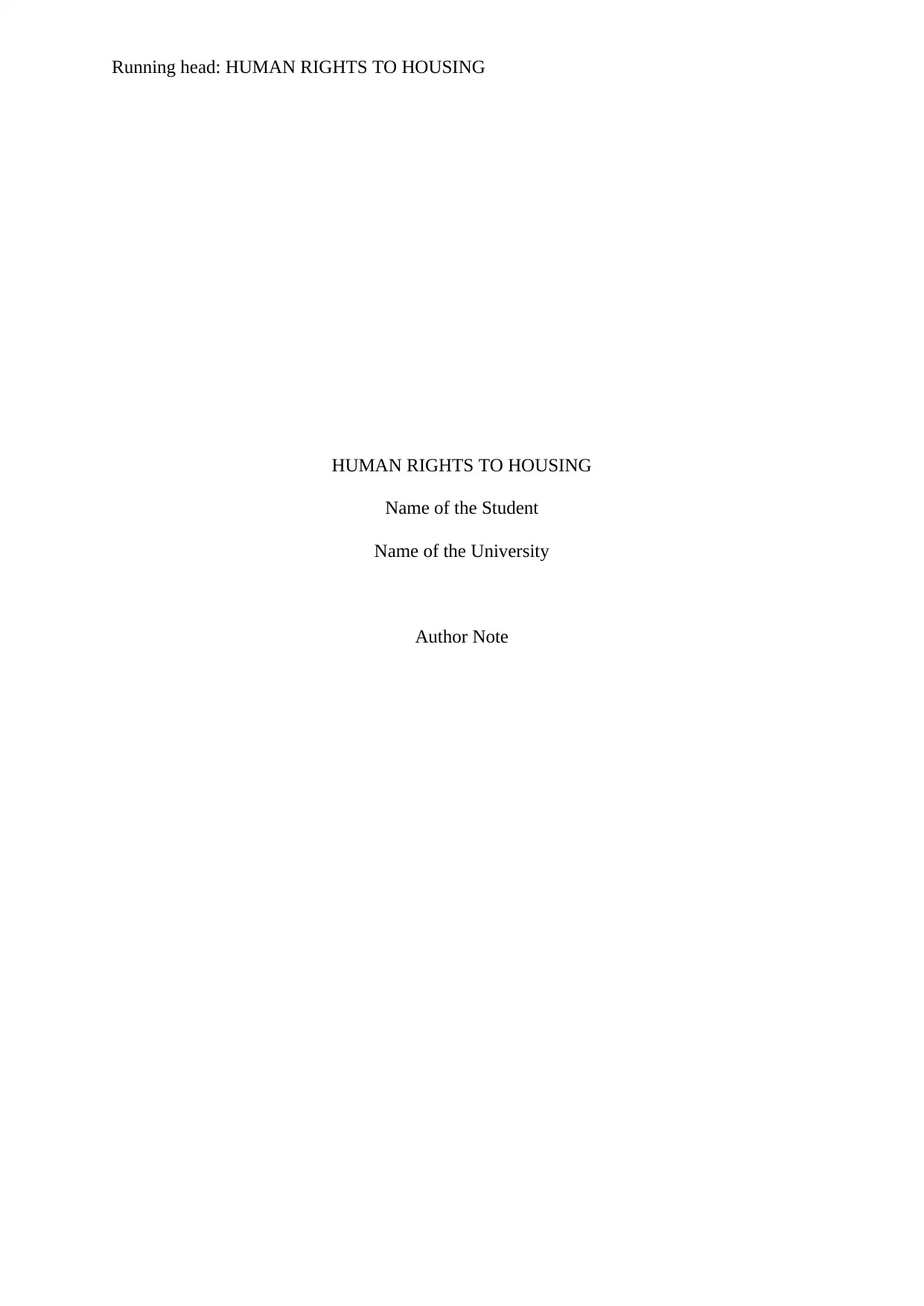
Running head: HUMAN RIGHTS TO HOUSING
HUMAN RIGHTS TO HOUSING
Name of the Student
Name of the University
Author Note
HUMAN RIGHTS TO HOUSING
Name of the Student
Name of the University
Author Note
Paraphrase This Document
Need a fresh take? Get an instant paraphrase of this document with our AI Paraphraser
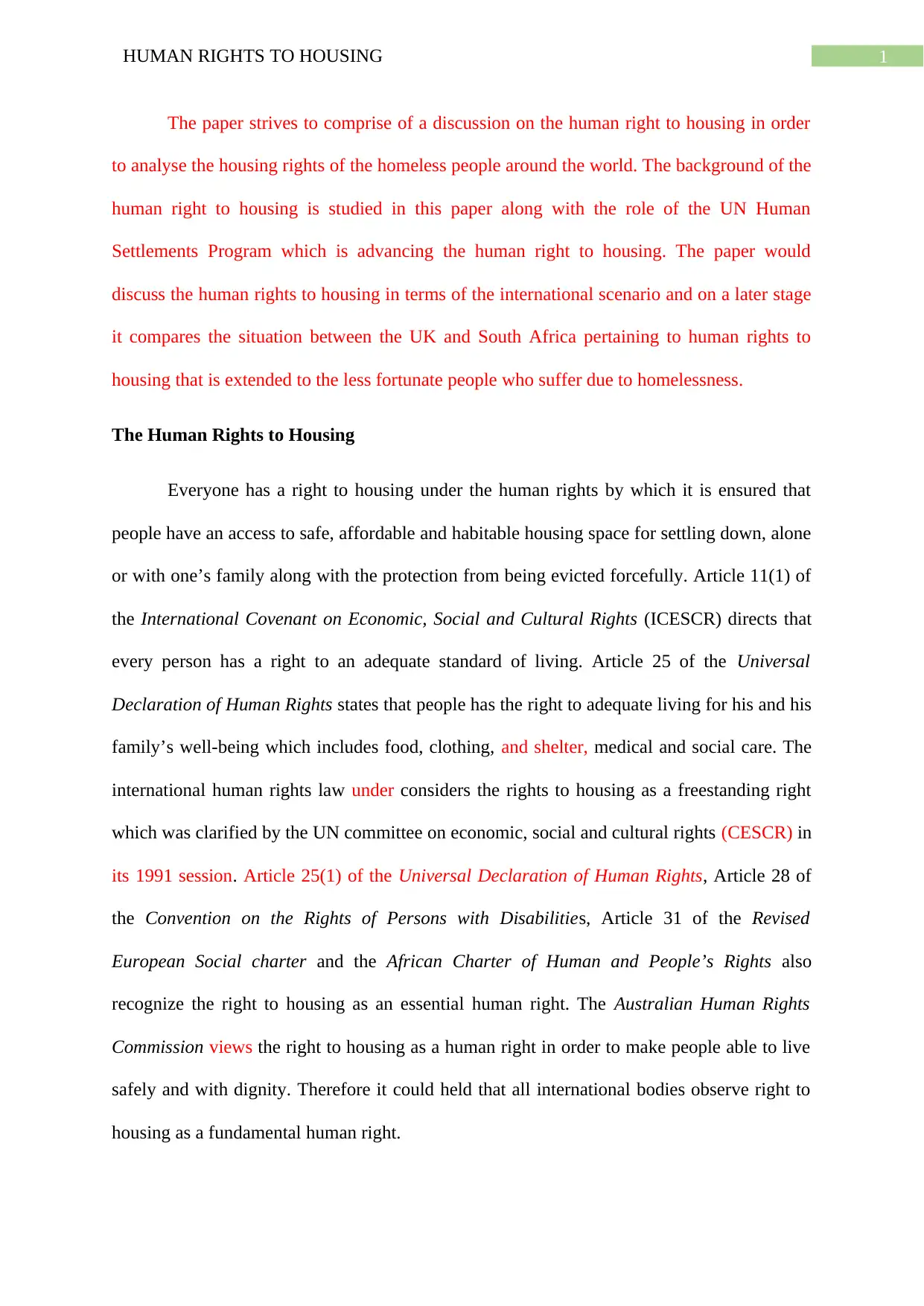
1HUMAN RIGHTS TO HOUSING
The paper strives to comprise of a discussion on the human right to housing in order
to analyse the housing rights of the homeless people around the world. The background of the
human right to housing is studied in this paper along with the role of the UN Human
Settlements Program which is advancing the human right to housing. The paper would
discuss the human rights to housing in terms of the international scenario and on a later stage
it compares the situation between the UK and South Africa pertaining to human rights to
housing that is extended to the less fortunate people who suffer due to homelessness.
The Human Rights to Housing
Everyone has a right to housing under the human rights by which it is ensured that
people have an access to safe, affordable and habitable housing space for settling down, alone
or with one’s family along with the protection from being evicted forcefully. Article 11(1) of
the International Covenant on Economic, Social and Cultural Rights (ICESCR) directs that
every person has a right to an adequate standard of living. Article 25 of the Universal
Declaration of Human Rights states that people has the right to adequate living for his and his
family’s well-being which includes food, clothing, and shelter, medical and social care. The
international human rights law under considers the rights to housing as a freestanding right
which was clarified by the UN committee on economic, social and cultural rights (CESCR) in
its 1991 session. Article 25(1) of the Universal Declaration of Human Rights, Article 28 of
the Convention on the Rights of Persons with Disabilities, Article 31 of the Revised
European Social charter and the African Charter of Human and People’s Rights also
recognize the right to housing as an essential human right. The Australian Human Rights
Commission views the right to housing as a human right in order to make people able to live
safely and with dignity. Therefore it could held that all international bodies observe right to
housing as a fundamental human right.
The paper strives to comprise of a discussion on the human right to housing in order
to analyse the housing rights of the homeless people around the world. The background of the
human right to housing is studied in this paper along with the role of the UN Human
Settlements Program which is advancing the human right to housing. The paper would
discuss the human rights to housing in terms of the international scenario and on a later stage
it compares the situation between the UK and South Africa pertaining to human rights to
housing that is extended to the less fortunate people who suffer due to homelessness.
The Human Rights to Housing
Everyone has a right to housing under the human rights by which it is ensured that
people have an access to safe, affordable and habitable housing space for settling down, alone
or with one’s family along with the protection from being evicted forcefully. Article 11(1) of
the International Covenant on Economic, Social and Cultural Rights (ICESCR) directs that
every person has a right to an adequate standard of living. Article 25 of the Universal
Declaration of Human Rights states that people has the right to adequate living for his and his
family’s well-being which includes food, clothing, and shelter, medical and social care. The
international human rights law under considers the rights to housing as a freestanding right
which was clarified by the UN committee on economic, social and cultural rights (CESCR) in
its 1991 session. Article 25(1) of the Universal Declaration of Human Rights, Article 28 of
the Convention on the Rights of Persons with Disabilities, Article 31 of the Revised
European Social charter and the African Charter of Human and People’s Rights also
recognize the right to housing as an essential human right. The Australian Human Rights
Commission views the right to housing as a human right in order to make people able to live
safely and with dignity. Therefore it could held that all international bodies observe right to
housing as a fundamental human right.
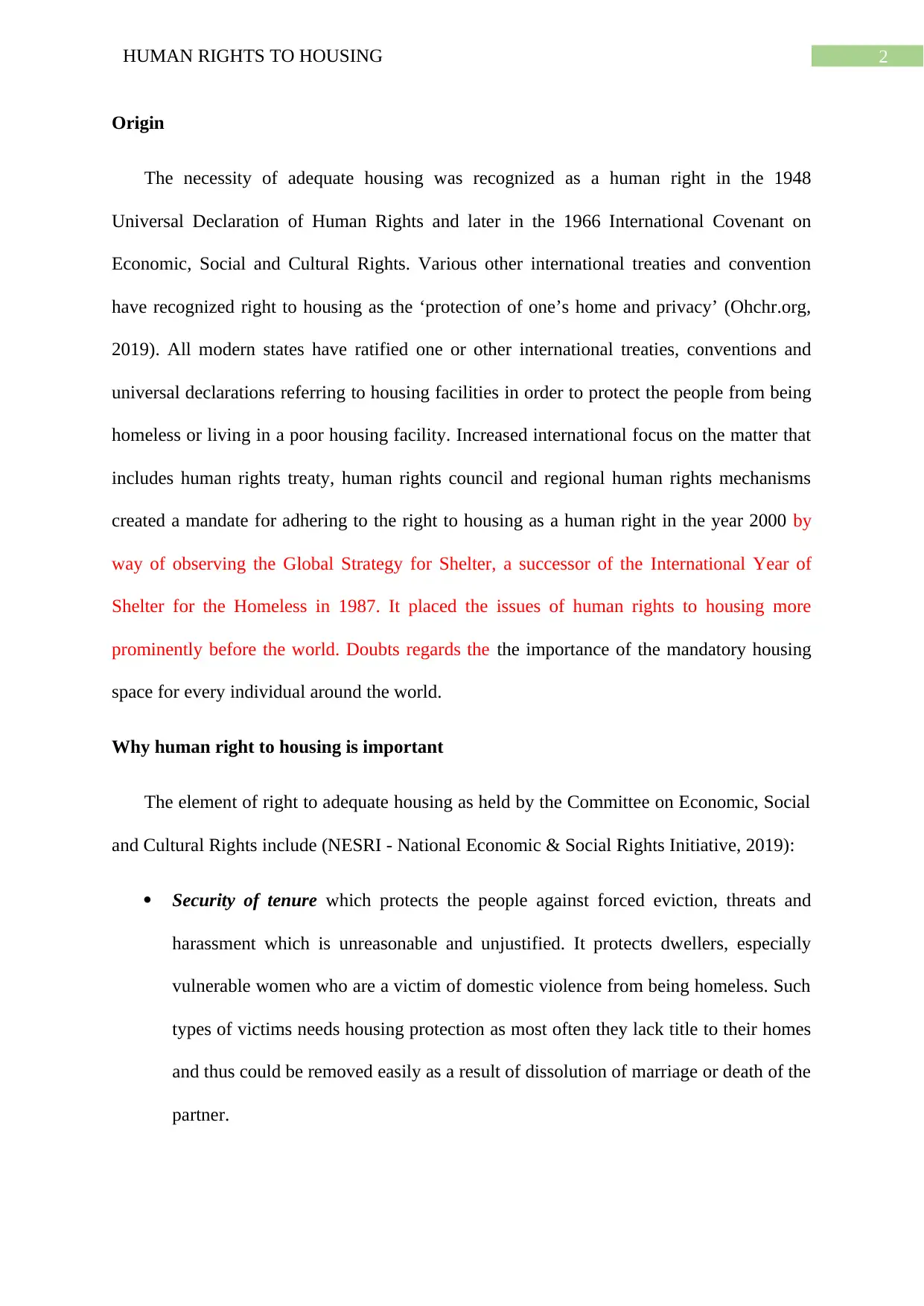
2HUMAN RIGHTS TO HOUSING
Origin
The necessity of adequate housing was recognized as a human right in the 1948
Universal Declaration of Human Rights and later in the 1966 International Covenant on
Economic, Social and Cultural Rights. Various other international treaties and convention
have recognized right to housing as the ‘protection of one’s home and privacy’ (Ohchr.org,
2019). All modern states have ratified one or other international treaties, conventions and
universal declarations referring to housing facilities in order to protect the people from being
homeless or living in a poor housing facility. Increased international focus on the matter that
includes human rights treaty, human rights council and regional human rights mechanisms
created a mandate for adhering to the right to housing as a human right in the year 2000 by
way of observing the Global Strategy for Shelter, a successor of the International Year of
Shelter for the Homeless in 1987. It placed the issues of human rights to housing more
prominently before the world. Doubts regards the the importance of the mandatory housing
space for every individual around the world.
Why human right to housing is important
The element of right to adequate housing as held by the Committee on Economic, Social
and Cultural Rights include (NESRI - National Economic & Social Rights Initiative, 2019):
Security of tenure which protects the people against forced eviction, threats and
harassment which is unreasonable and unjustified. It protects dwellers, especially
vulnerable women who are a victim of domestic violence from being homeless. Such
types of victims needs housing protection as most often they lack title to their homes
and thus could be removed easily as a result of dissolution of marriage or death of the
partner.
Origin
The necessity of adequate housing was recognized as a human right in the 1948
Universal Declaration of Human Rights and later in the 1966 International Covenant on
Economic, Social and Cultural Rights. Various other international treaties and convention
have recognized right to housing as the ‘protection of one’s home and privacy’ (Ohchr.org,
2019). All modern states have ratified one or other international treaties, conventions and
universal declarations referring to housing facilities in order to protect the people from being
homeless or living in a poor housing facility. Increased international focus on the matter that
includes human rights treaty, human rights council and regional human rights mechanisms
created a mandate for adhering to the right to housing as a human right in the year 2000 by
way of observing the Global Strategy for Shelter, a successor of the International Year of
Shelter for the Homeless in 1987. It placed the issues of human rights to housing more
prominently before the world. Doubts regards the the importance of the mandatory housing
space for every individual around the world.
Why human right to housing is important
The element of right to adequate housing as held by the Committee on Economic, Social
and Cultural Rights include (NESRI - National Economic & Social Rights Initiative, 2019):
Security of tenure which protects the people against forced eviction, threats and
harassment which is unreasonable and unjustified. It protects dwellers, especially
vulnerable women who are a victim of domestic violence from being homeless. Such
types of victims needs housing protection as most often they lack title to their homes
and thus could be removed easily as a result of dissolution of marriage or death of the
partner.
⊘ This is a preview!⊘
Do you want full access?
Subscribe today to unlock all pages.

Trusted by 1+ million students worldwide
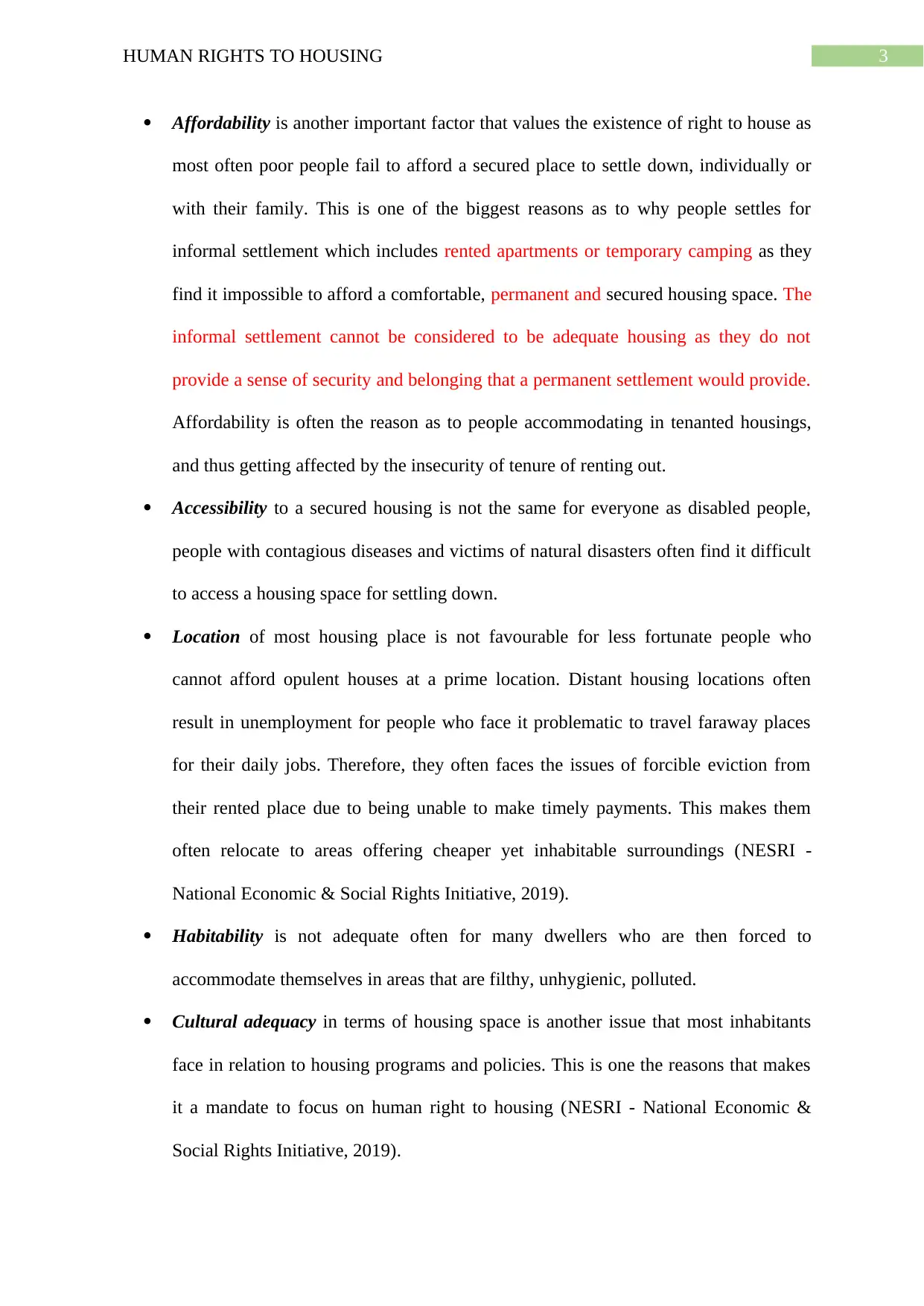
3HUMAN RIGHTS TO HOUSING
Affordability is another important factor that values the existence of right to house as
most often poor people fail to afford a secured place to settle down, individually or
with their family. This is one of the biggest reasons as to why people settles for
informal settlement which includes rented apartments or temporary camping as they
find it impossible to afford a comfortable, permanent and secured housing space. The
informal settlement cannot be considered to be adequate housing as they do not
provide a sense of security and belonging that a permanent settlement would provide.
Affordability is often the reason as to people accommodating in tenanted housings,
and thus getting affected by the insecurity of tenure of renting out.
Accessibility to a secured housing is not the same for everyone as disabled people,
people with contagious diseases and victims of natural disasters often find it difficult
to access a housing space for settling down.
Location of most housing place is not favourable for less fortunate people who
cannot afford opulent houses at a prime location. Distant housing locations often
result in unemployment for people who face it problematic to travel faraway places
for their daily jobs. Therefore, they often faces the issues of forcible eviction from
their rented place due to being unable to make timely payments. This makes them
often relocate to areas offering cheaper yet inhabitable surroundings (NESRI -
National Economic & Social Rights Initiative, 2019).
Habitability is not adequate often for many dwellers who are then forced to
accommodate themselves in areas that are filthy, unhygienic, polluted.
Cultural adequacy in terms of housing space is another issue that most inhabitants
face in relation to housing programs and policies. This is one the reasons that makes
it a mandate to focus on human right to housing (NESRI - National Economic &
Social Rights Initiative, 2019).
Affordability is another important factor that values the existence of right to house as
most often poor people fail to afford a secured place to settle down, individually or
with their family. This is one of the biggest reasons as to why people settles for
informal settlement which includes rented apartments or temporary camping as they
find it impossible to afford a comfortable, permanent and secured housing space. The
informal settlement cannot be considered to be adequate housing as they do not
provide a sense of security and belonging that a permanent settlement would provide.
Affordability is often the reason as to people accommodating in tenanted housings,
and thus getting affected by the insecurity of tenure of renting out.
Accessibility to a secured housing is not the same for everyone as disabled people,
people with contagious diseases and victims of natural disasters often find it difficult
to access a housing space for settling down.
Location of most housing place is not favourable for less fortunate people who
cannot afford opulent houses at a prime location. Distant housing locations often
result in unemployment for people who face it problematic to travel faraway places
for their daily jobs. Therefore, they often faces the issues of forcible eviction from
their rented place due to being unable to make timely payments. This makes them
often relocate to areas offering cheaper yet inhabitable surroundings (NESRI -
National Economic & Social Rights Initiative, 2019).
Habitability is not adequate often for many dwellers who are then forced to
accommodate themselves in areas that are filthy, unhygienic, polluted.
Cultural adequacy in terms of housing space is another issue that most inhabitants
face in relation to housing programs and policies. This is one the reasons that makes
it a mandate to focus on human right to housing (NESRI - National Economic &
Social Rights Initiative, 2019).
Paraphrase This Document
Need a fresh take? Get an instant paraphrase of this document with our AI Paraphraser
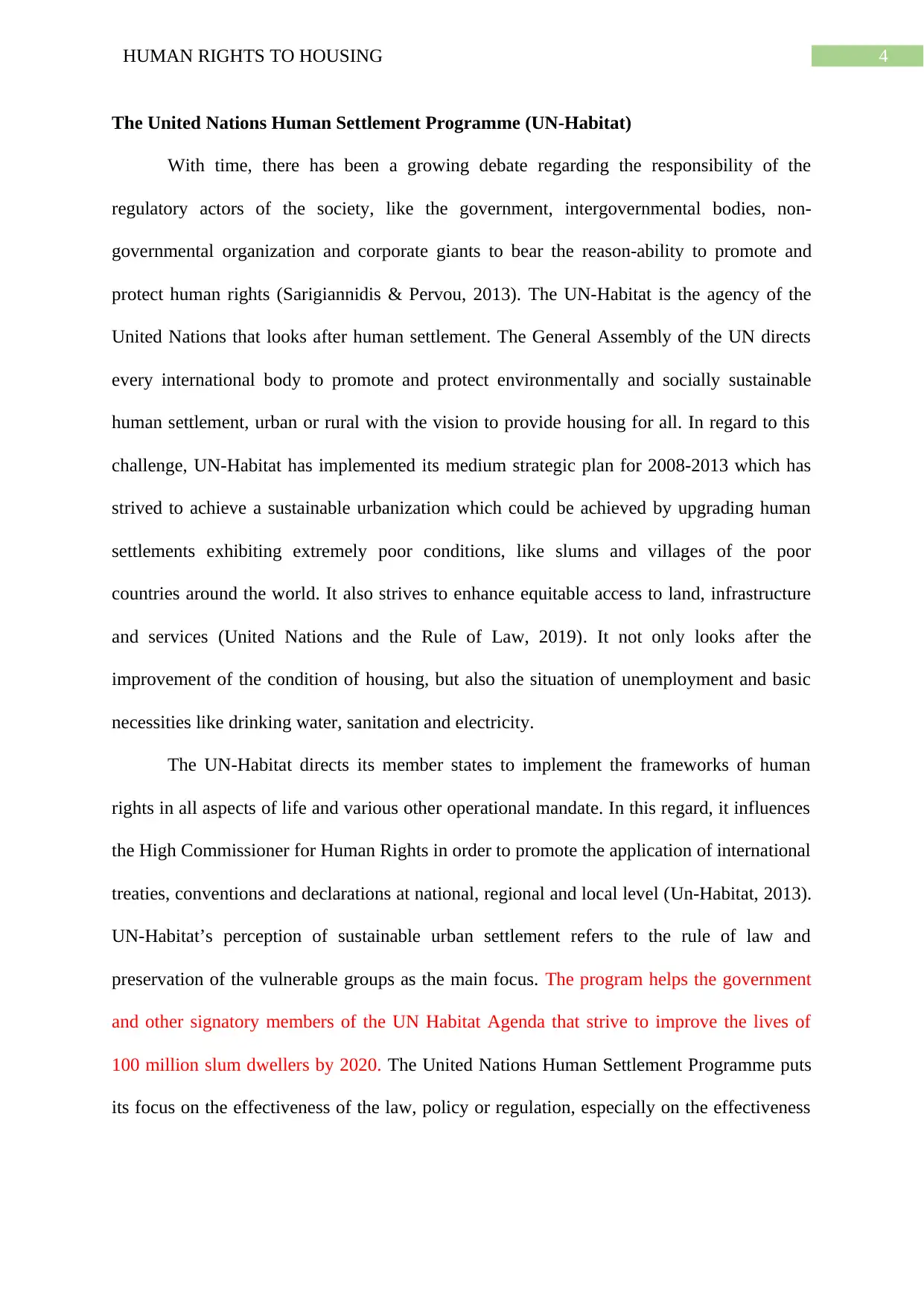
4HUMAN RIGHTS TO HOUSING
The United Nations Human Settlement Programme (UN-Habitat)
With time, there has been a growing debate regarding the responsibility of the
regulatory actors of the society, like the government, intergovernmental bodies, non-
governmental organization and corporate giants to bear the reason-ability to promote and
protect human rights (Sarigiannidis & Pervou, 2013). The UN-Habitat is the agency of the
United Nations that looks after human settlement. The General Assembly of the UN directs
every international body to promote and protect environmentally and socially sustainable
human settlement, urban or rural with the vision to provide housing for all. In regard to this
challenge, UN-Habitat has implemented its medium strategic plan for 2008-2013 which has
strived to achieve a sustainable urbanization which could be achieved by upgrading human
settlements exhibiting extremely poor conditions, like slums and villages of the poor
countries around the world. It also strives to enhance equitable access to land, infrastructure
and services (United Nations and the Rule of Law, 2019). It not only looks after the
improvement of the condition of housing, but also the situation of unemployment and basic
necessities like drinking water, sanitation and electricity.
The UN-Habitat directs its member states to implement the frameworks of human
rights in all aspects of life and various other operational mandate. In this regard, it influences
the High Commissioner for Human Rights in order to promote the application of international
treaties, conventions and declarations at national, regional and local level (Un-Habitat, 2013).
UN-Habitat’s perception of sustainable urban settlement refers to the rule of law and
preservation of the vulnerable groups as the main focus. The program helps the government
and other signatory members of the UN Habitat Agenda that strive to improve the lives of
100 million slum dwellers by 2020. The United Nations Human Settlement Programme puts
its focus on the effectiveness of the law, policy or regulation, especially on the effectiveness
The United Nations Human Settlement Programme (UN-Habitat)
With time, there has been a growing debate regarding the responsibility of the
regulatory actors of the society, like the government, intergovernmental bodies, non-
governmental organization and corporate giants to bear the reason-ability to promote and
protect human rights (Sarigiannidis & Pervou, 2013). The UN-Habitat is the agency of the
United Nations that looks after human settlement. The General Assembly of the UN directs
every international body to promote and protect environmentally and socially sustainable
human settlement, urban or rural with the vision to provide housing for all. In regard to this
challenge, UN-Habitat has implemented its medium strategic plan for 2008-2013 which has
strived to achieve a sustainable urbanization which could be achieved by upgrading human
settlements exhibiting extremely poor conditions, like slums and villages of the poor
countries around the world. It also strives to enhance equitable access to land, infrastructure
and services (United Nations and the Rule of Law, 2019). It not only looks after the
improvement of the condition of housing, but also the situation of unemployment and basic
necessities like drinking water, sanitation and electricity.
The UN-Habitat directs its member states to implement the frameworks of human
rights in all aspects of life and various other operational mandate. In this regard, it influences
the High Commissioner for Human Rights in order to promote the application of international
treaties, conventions and declarations at national, regional and local level (Un-Habitat, 2013).
UN-Habitat’s perception of sustainable urban settlement refers to the rule of law and
preservation of the vulnerable groups as the main focus. The program helps the government
and other signatory members of the UN Habitat Agenda that strive to improve the lives of
100 million slum dwellers by 2020. The United Nations Human Settlement Programme puts
its focus on the effectiveness of the law, policy or regulation, especially on the effectiveness
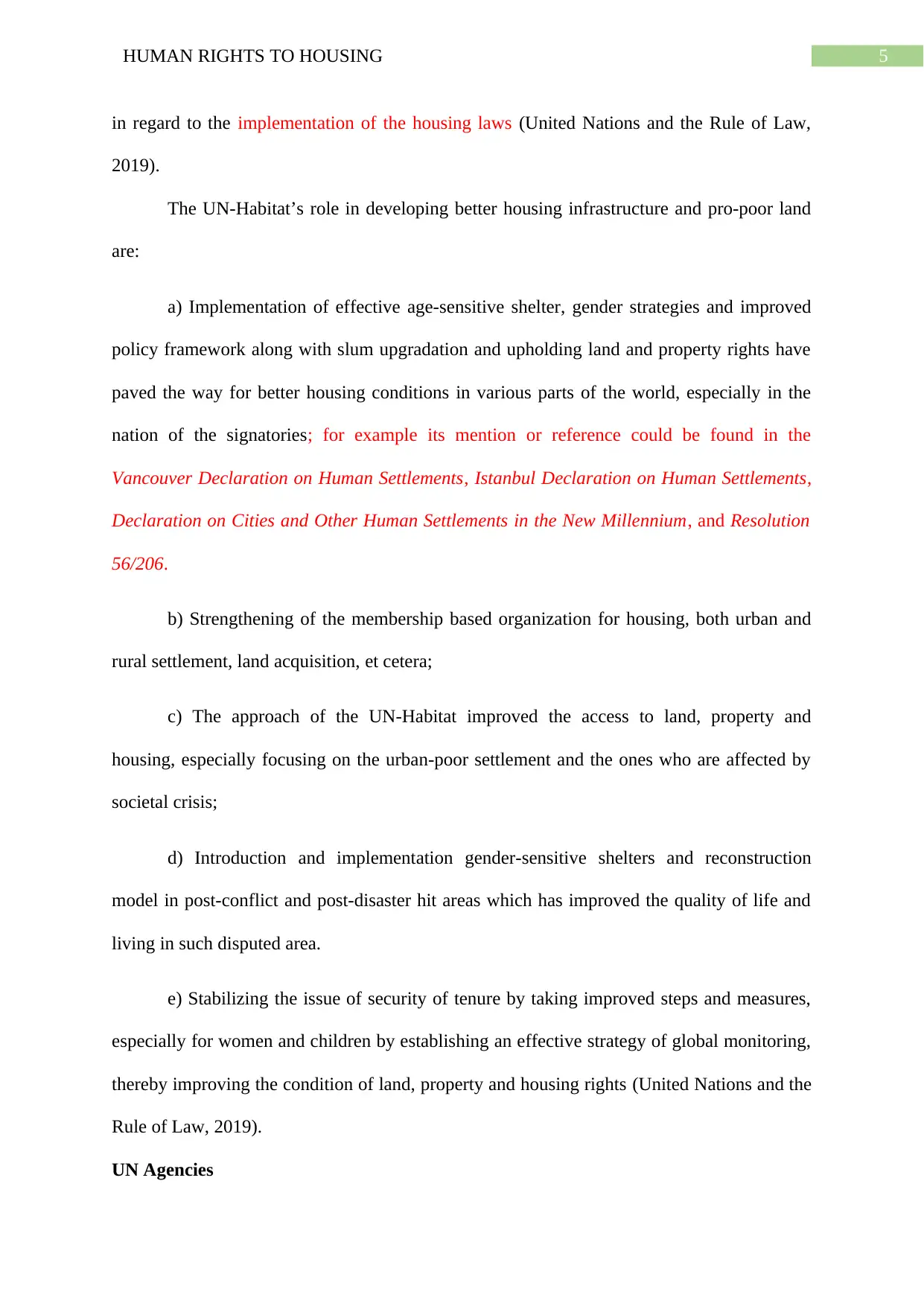
5HUMAN RIGHTS TO HOUSING
in regard to the implementation of the housing laws (United Nations and the Rule of Law,
2019).
The UN-Habitat’s role in developing better housing infrastructure and pro-poor land
are:
a) Implementation of effective age-sensitive shelter, gender strategies and improved
policy framework along with slum upgradation and upholding land and property rights have
paved the way for better housing conditions in various parts of the world, especially in the
nation of the signatories; for example its mention or reference could be found in the
Vancouver Declaration on Human Settlements, Istanbul Declaration on Human Settlements,
Declaration on Cities and Other Human Settlements in the New Millennium, and Resolution
56/206.
b) Strengthening of the membership based organization for housing, both urban and
rural settlement, land acquisition, et cetera;
c) The approach of the UN-Habitat improved the access to land, property and
housing, especially focusing on the urban-poor settlement and the ones who are affected by
societal crisis;
d) Introduction and implementation gender-sensitive shelters and reconstruction
model in post-conflict and post-disaster hit areas which has improved the quality of life and
living in such disputed area.
e) Stabilizing the issue of security of tenure by taking improved steps and measures,
especially for women and children by establishing an effective strategy of global monitoring,
thereby improving the condition of land, property and housing rights (United Nations and the
Rule of Law, 2019).
UN Agencies
in regard to the implementation of the housing laws (United Nations and the Rule of Law,
2019).
The UN-Habitat’s role in developing better housing infrastructure and pro-poor land
are:
a) Implementation of effective age-sensitive shelter, gender strategies and improved
policy framework along with slum upgradation and upholding land and property rights have
paved the way for better housing conditions in various parts of the world, especially in the
nation of the signatories; for example its mention or reference could be found in the
Vancouver Declaration on Human Settlements, Istanbul Declaration on Human Settlements,
Declaration on Cities and Other Human Settlements in the New Millennium, and Resolution
56/206.
b) Strengthening of the membership based organization for housing, both urban and
rural settlement, land acquisition, et cetera;
c) The approach of the UN-Habitat improved the access to land, property and
housing, especially focusing on the urban-poor settlement and the ones who are affected by
societal crisis;
d) Introduction and implementation gender-sensitive shelters and reconstruction
model in post-conflict and post-disaster hit areas which has improved the quality of life and
living in such disputed area.
e) Stabilizing the issue of security of tenure by taking improved steps and measures,
especially for women and children by establishing an effective strategy of global monitoring,
thereby improving the condition of land, property and housing rights (United Nations and the
Rule of Law, 2019).
UN Agencies
⊘ This is a preview!⊘
Do you want full access?
Subscribe today to unlock all pages.

Trusted by 1+ million students worldwide
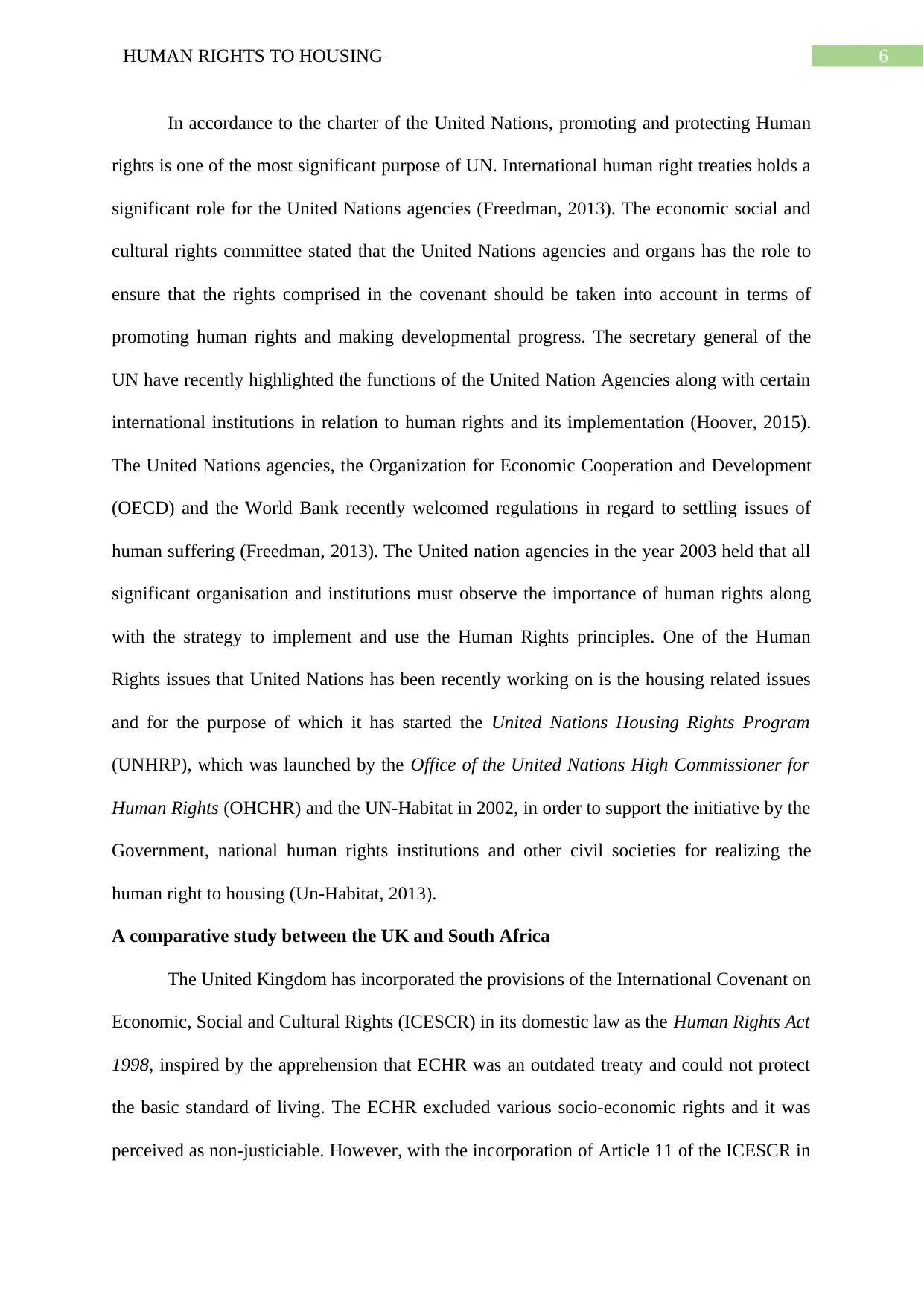
6HUMAN RIGHTS TO HOUSING
In accordance to the charter of the United Nations, promoting and protecting Human
rights is one of the most significant purpose of UN. International human right treaties holds a
significant role for the United Nations agencies (Freedman, 2013). The economic social and
cultural rights committee stated that the United Nations agencies and organs has the role to
ensure that the rights comprised in the covenant should be taken into account in terms of
promoting human rights and making developmental progress. The secretary general of the
UN have recently highlighted the functions of the United Nation Agencies along with certain
international institutions in relation to human rights and its implementation (Hoover, 2015).
The United Nations agencies, the Organization for Economic Cooperation and Development
(OECD) and the World Bank recently welcomed regulations in regard to settling issues of
human suffering (Freedman, 2013). The United nation agencies in the year 2003 held that all
significant organisation and institutions must observe the importance of human rights along
with the strategy to implement and use the Human Rights principles. One of the Human
Rights issues that United Nations has been recently working on is the housing related issues
and for the purpose of which it has started the United Nations Housing Rights Program
(UNHRP), which was launched by the Office of the United Nations High Commissioner for
Human Rights (OHCHR) and the UN-Habitat in 2002, in order to support the initiative by the
Government, national human rights institutions and other civil societies for realizing the
human right to housing (Un-Habitat, 2013).
A comparative study between the UK and South Africa
The United Kingdom has incorporated the provisions of the International Covenant on
Economic, Social and Cultural Rights (ICESCR) in its domestic law as the Human Rights Act
1998, inspired by the apprehension that ECHR was an outdated treaty and could not protect
the basic standard of living. The ECHR excluded various socio-economic rights and it was
perceived as non-justiciable. However, with the incorporation of Article 11 of the ICESCR in
In accordance to the charter of the United Nations, promoting and protecting Human
rights is one of the most significant purpose of UN. International human right treaties holds a
significant role for the United Nations agencies (Freedman, 2013). The economic social and
cultural rights committee stated that the United Nations agencies and organs has the role to
ensure that the rights comprised in the covenant should be taken into account in terms of
promoting human rights and making developmental progress. The secretary general of the
UN have recently highlighted the functions of the United Nation Agencies along with certain
international institutions in relation to human rights and its implementation (Hoover, 2015).
The United Nations agencies, the Organization for Economic Cooperation and Development
(OECD) and the World Bank recently welcomed regulations in regard to settling issues of
human suffering (Freedman, 2013). The United nation agencies in the year 2003 held that all
significant organisation and institutions must observe the importance of human rights along
with the strategy to implement and use the Human Rights principles. One of the Human
Rights issues that United Nations has been recently working on is the housing related issues
and for the purpose of which it has started the United Nations Housing Rights Program
(UNHRP), which was launched by the Office of the United Nations High Commissioner for
Human Rights (OHCHR) and the UN-Habitat in 2002, in order to support the initiative by the
Government, national human rights institutions and other civil societies for realizing the
human right to housing (Un-Habitat, 2013).
A comparative study between the UK and South Africa
The United Kingdom has incorporated the provisions of the International Covenant on
Economic, Social and Cultural Rights (ICESCR) in its domestic law as the Human Rights Act
1998, inspired by the apprehension that ECHR was an outdated treaty and could not protect
the basic standard of living. The ECHR excluded various socio-economic rights and it was
perceived as non-justiciable. However, with the incorporation of Article 11 of the ICESCR in
Paraphrase This Document
Need a fresh take? Get an instant paraphrase of this document with our AI Paraphraser
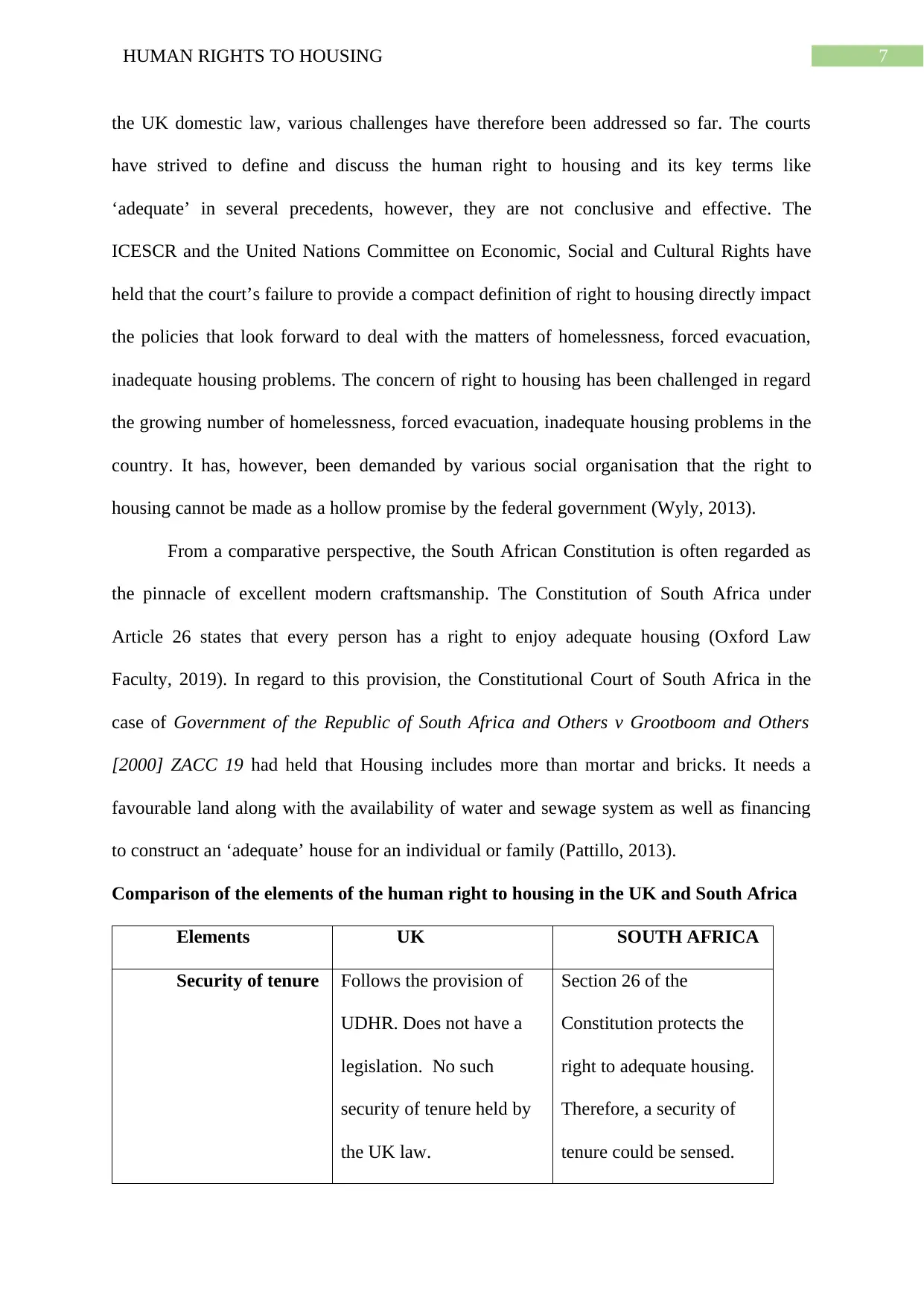
7HUMAN RIGHTS TO HOUSING
the UK domestic law, various challenges have therefore been addressed so far. The courts
have strived to define and discuss the human right to housing and its key terms like
‘adequate’ in several precedents, however, they are not conclusive and effective. The
ICESCR and the United Nations Committee on Economic, Social and Cultural Rights have
held that the court’s failure to provide a compact definition of right to housing directly impact
the policies that look forward to deal with the matters of homelessness, forced evacuation,
inadequate housing problems. The concern of right to housing has been challenged in regard
the growing number of homelessness, forced evacuation, inadequate housing problems in the
country. It has, however, been demanded by various social organisation that the right to
housing cannot be made as a hollow promise by the federal government (Wyly, 2013).
From a comparative perspective, the South African Constitution is often regarded as
the pinnacle of excellent modern craftsmanship. The Constitution of South Africa under
Article 26 states that every person has a right to enjoy adequate housing (Oxford Law
Faculty, 2019). In regard to this provision, the Constitutional Court of South Africa in the
case of Government of the Republic of South Africa and Others v Grootboom and Others
[2000] ZACC 19 had held that Housing includes more than mortar and bricks. It needs a
favourable land along with the availability of water and sewage system as well as financing
to construct an ‘adequate’ house for an individual or family (Pattillo, 2013).
Comparison of the elements of the human right to housing in the UK and South Africa
Elements UK SOUTH AFRICA
Security of tenure Follows the provision of
UDHR. Does not have a
legislation. No such
security of tenure held by
the UK law.
Section 26 of the
Constitution protects the
right to adequate housing.
Therefore, a security of
tenure could be sensed.
the UK domestic law, various challenges have therefore been addressed so far. The courts
have strived to define and discuss the human right to housing and its key terms like
‘adequate’ in several precedents, however, they are not conclusive and effective. The
ICESCR and the United Nations Committee on Economic, Social and Cultural Rights have
held that the court’s failure to provide a compact definition of right to housing directly impact
the policies that look forward to deal with the matters of homelessness, forced evacuation,
inadequate housing problems. The concern of right to housing has been challenged in regard
the growing number of homelessness, forced evacuation, inadequate housing problems in the
country. It has, however, been demanded by various social organisation that the right to
housing cannot be made as a hollow promise by the federal government (Wyly, 2013).
From a comparative perspective, the South African Constitution is often regarded as
the pinnacle of excellent modern craftsmanship. The Constitution of South Africa under
Article 26 states that every person has a right to enjoy adequate housing (Oxford Law
Faculty, 2019). In regard to this provision, the Constitutional Court of South Africa in the
case of Government of the Republic of South Africa and Others v Grootboom and Others
[2000] ZACC 19 had held that Housing includes more than mortar and bricks. It needs a
favourable land along with the availability of water and sewage system as well as financing
to construct an ‘adequate’ house for an individual or family (Pattillo, 2013).
Comparison of the elements of the human right to housing in the UK and South Africa
Elements UK SOUTH AFRICA
Security of tenure Follows the provision of
UDHR. Does not have a
legislation. No such
security of tenure held by
the UK law.
Section 26 of the
Constitution protects the
right to adequate housing.
Therefore, a security of
tenure could be sensed.
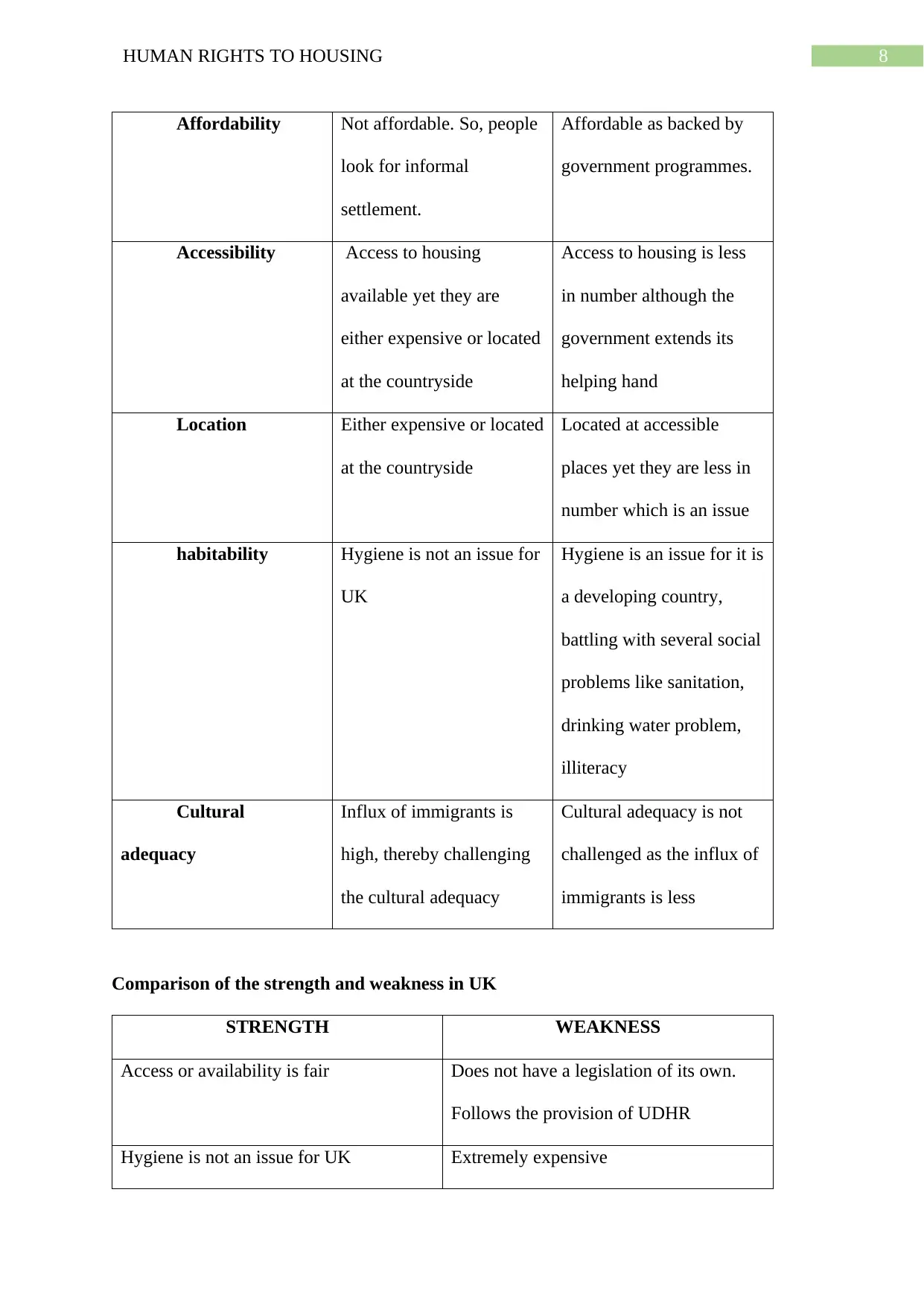
8HUMAN RIGHTS TO HOUSING
Affordability Not affordable. So, people
look for informal
settlement.
Affordable as backed by
government programmes.
Accessibility Access to housing
available yet they are
either expensive or located
at the countryside
Access to housing is less
in number although the
government extends its
helping hand
Location Either expensive or located
at the countryside
Located at accessible
places yet they are less in
number which is an issue
habitability Hygiene is not an issue for
UK
Hygiene is an issue for it is
a developing country,
battling with several social
problems like sanitation,
drinking water problem,
illiteracy
Cultural
adequacy
Influx of immigrants is
high, thereby challenging
the cultural adequacy
Cultural adequacy is not
challenged as the influx of
immigrants is less
Comparison of the strength and weakness in UK
STRENGTH WEAKNESS
Access or availability is fair Does not have a legislation of its own.
Follows the provision of UDHR
Hygiene is not an issue for UK Extremely expensive
Affordability Not affordable. So, people
look for informal
settlement.
Affordable as backed by
government programmes.
Accessibility Access to housing
available yet they are
either expensive or located
at the countryside
Access to housing is less
in number although the
government extends its
helping hand
Location Either expensive or located
at the countryside
Located at accessible
places yet they are less in
number which is an issue
habitability Hygiene is not an issue for
UK
Hygiene is an issue for it is
a developing country,
battling with several social
problems like sanitation,
drinking water problem,
illiteracy
Cultural
adequacy
Influx of immigrants is
high, thereby challenging
the cultural adequacy
Cultural adequacy is not
challenged as the influx of
immigrants is less
Comparison of the strength and weakness in UK
STRENGTH WEAKNESS
Access or availability is fair Does not have a legislation of its own.
Follows the provision of UDHR
Hygiene is not an issue for UK Extremely expensive
⊘ This is a preview!⊘
Do you want full access?
Subscribe today to unlock all pages.

Trusted by 1+ million students worldwide
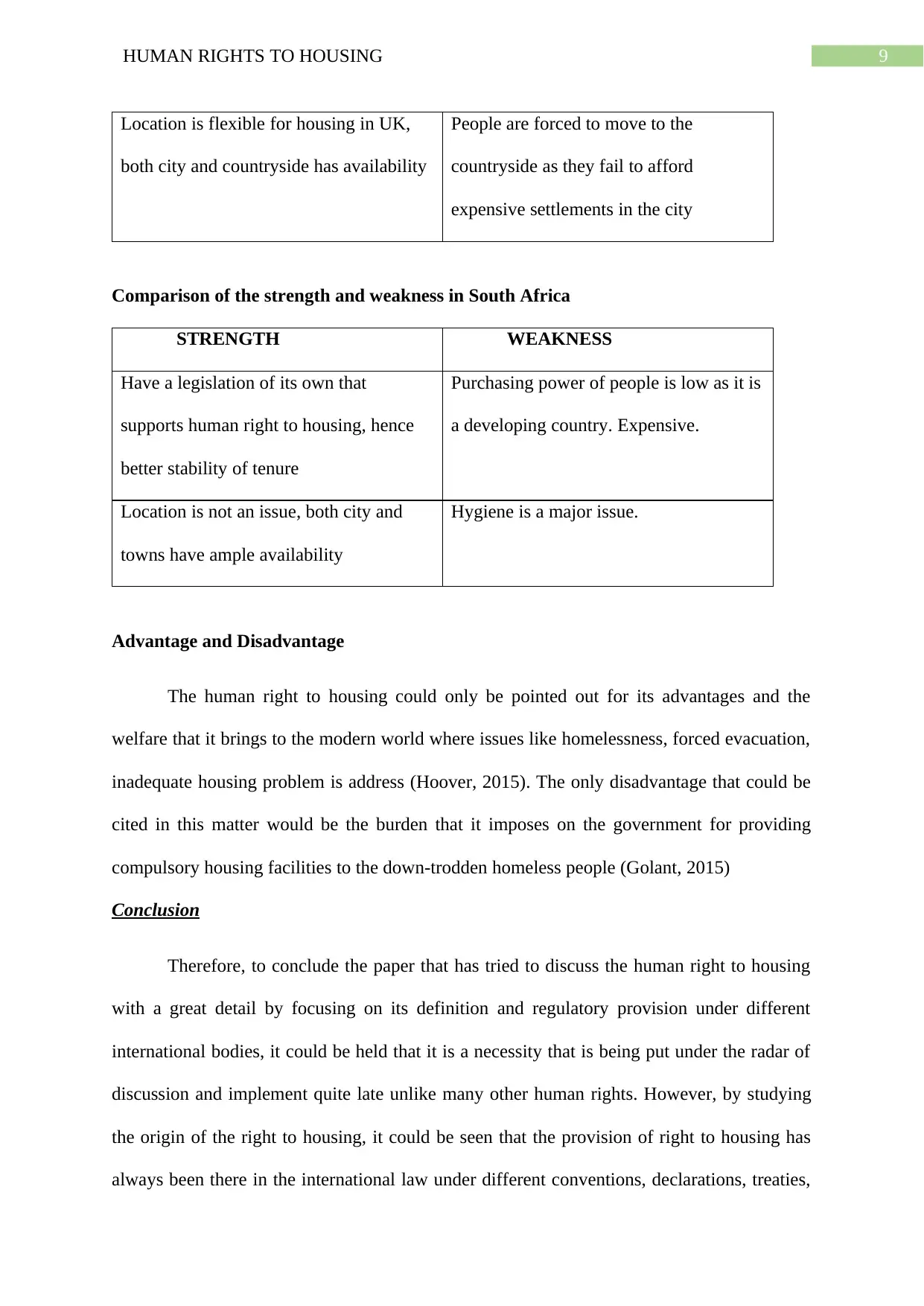
9HUMAN RIGHTS TO HOUSING
Location is flexible for housing in UK,
both city and countryside has availability
People are forced to move to the
countryside as they fail to afford
expensive settlements in the city
Comparison of the strength and weakness in South Africa
STRENGTH WEAKNESS
Have a legislation of its own that
supports human right to housing, hence
better stability of tenure
Purchasing power of people is low as it is
a developing country. Expensive.
Location is not an issue, both city and
towns have ample availability
Hygiene is a major issue.
Advantage and Disadvantage
The human right to housing could only be pointed out for its advantages and the
welfare that it brings to the modern world where issues like homelessness, forced evacuation,
inadequate housing problem is address (Hoover, 2015). The only disadvantage that could be
cited in this matter would be the burden that it imposes on the government for providing
compulsory housing facilities to the down-trodden homeless people (Golant, 2015)
Conclusion
Therefore, to conclude the paper that has tried to discuss the human right to housing
with a great detail by focusing on its definition and regulatory provision under different
international bodies, it could be held that it is a necessity that is being put under the radar of
discussion and implement quite late unlike many other human rights. However, by studying
the origin of the right to housing, it could be seen that the provision of right to housing has
always been there in the international law under different conventions, declarations, treaties,
Location is flexible for housing in UK,
both city and countryside has availability
People are forced to move to the
countryside as they fail to afford
expensive settlements in the city
Comparison of the strength and weakness in South Africa
STRENGTH WEAKNESS
Have a legislation of its own that
supports human right to housing, hence
better stability of tenure
Purchasing power of people is low as it is
a developing country. Expensive.
Location is not an issue, both city and
towns have ample availability
Hygiene is a major issue.
Advantage and Disadvantage
The human right to housing could only be pointed out for its advantages and the
welfare that it brings to the modern world where issues like homelessness, forced evacuation,
inadequate housing problem is address (Hoover, 2015). The only disadvantage that could be
cited in this matter would be the burden that it imposes on the government for providing
compulsory housing facilities to the down-trodden homeless people (Golant, 2015)
Conclusion
Therefore, to conclude the paper that has tried to discuss the human right to housing
with a great detail by focusing on its definition and regulatory provision under different
international bodies, it could be held that it is a necessity that is being put under the radar of
discussion and implement quite late unlike many other human rights. However, by studying
the origin of the right to housing, it could be seen that the provision of right to housing has
always been there in the international law under different conventions, declarations, treaties,
Paraphrase This Document
Need a fresh take? Get an instant paraphrase of this document with our AI Paraphraser

10HUMAN RIGHTS TO HOUSING
yet it is evident that it lacked an effective implementation over the years. The UN-Habitat, an
initiative by the United Nations has been resourceful and effective in terms of implementing
and guiding the member states to comply with the housing standards and promise to build an
adequate housing for the homeless.
yet it is evident that it lacked an effective implementation over the years. The UN-Habitat, an
initiative by the United Nations has been resourceful and effective in terms of implementing
and guiding the member states to comply with the housing standards and promise to build an
adequate housing for the homeless.
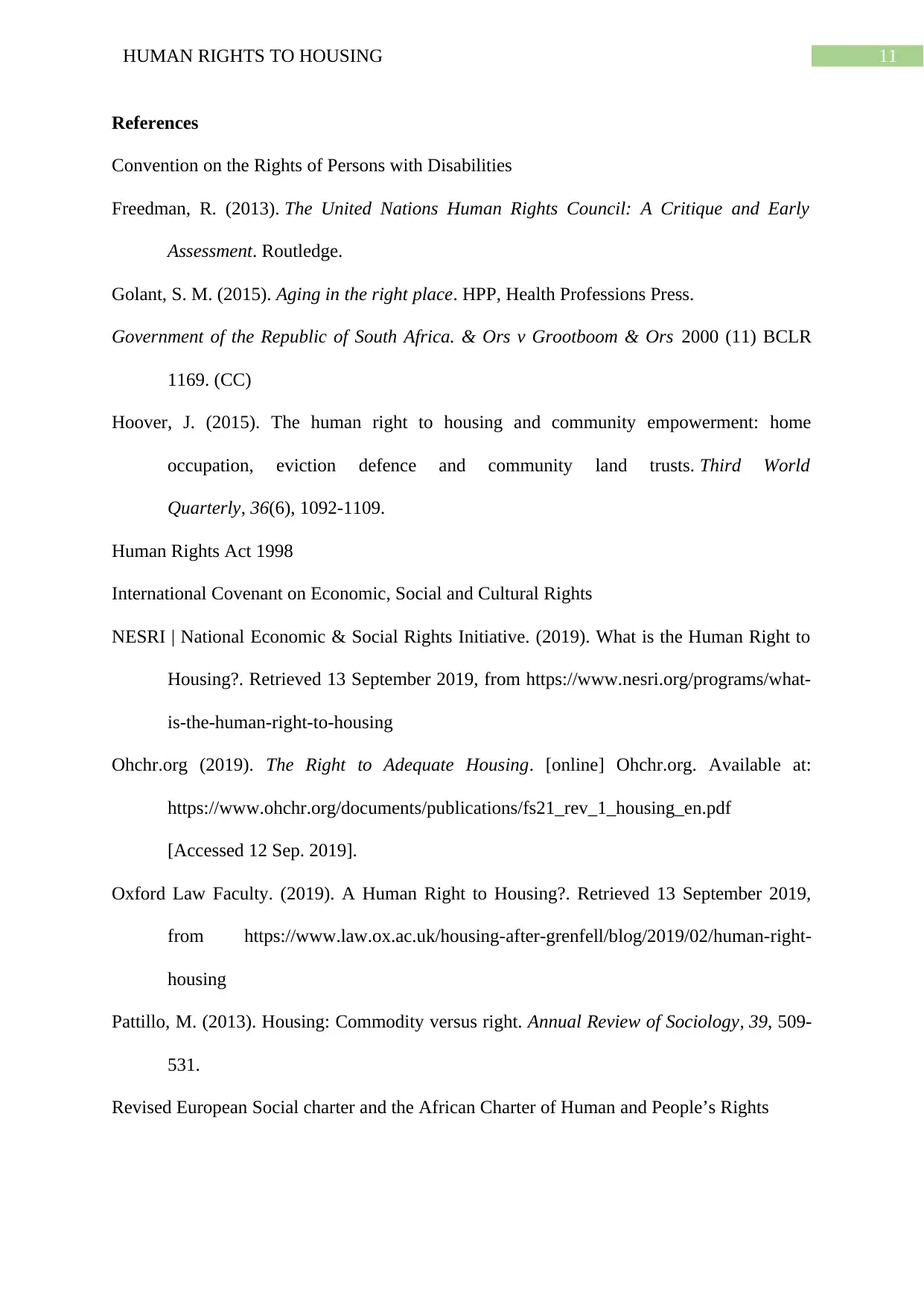
11HUMAN RIGHTS TO HOUSING
References
Convention on the Rights of Persons with Disabilities
Freedman, R. (2013). The United Nations Human Rights Council: A Critique and Early
Assessment. Routledge.
Golant, S. M. (2015). Aging in the right place. HPP, Health Professions Press.
Government of the Republic of South Africa. & Ors v Grootboom & Ors 2000 (11) BCLR
1169. (CC)
Hoover, J. (2015). The human right to housing and community empowerment: home
occupation, eviction defence and community land trusts. Third World
Quarterly, 36(6), 1092-1109.
Human Rights Act 1998
International Covenant on Economic, Social and Cultural Rights
NESRI | National Economic & Social Rights Initiative. (2019). What is the Human Right to
Housing?. Retrieved 13 September 2019, from https://www.nesri.org/programs/what-
is-the-human-right-to-housing
Ohchr.org (2019). The Right to Adequate Housing. [online] Ohchr.org. Available at:
https://www.ohchr.org/documents/publications/fs21_rev_1_housing_en.pdf
[Accessed 12 Sep. 2019].
Oxford Law Faculty. (2019). A Human Right to Housing?. Retrieved 13 September 2019,
from https://www.law.ox.ac.uk/housing-after-grenfell/blog/2019/02/human-right-
housing
Pattillo, M. (2013). Housing: Commodity versus right. Annual Review of Sociology, 39, 509-
531.
Revised European Social charter and the African Charter of Human and People’s Rights
References
Convention on the Rights of Persons with Disabilities
Freedman, R. (2013). The United Nations Human Rights Council: A Critique and Early
Assessment. Routledge.
Golant, S. M. (2015). Aging in the right place. HPP, Health Professions Press.
Government of the Republic of South Africa. & Ors v Grootboom & Ors 2000 (11) BCLR
1169. (CC)
Hoover, J. (2015). The human right to housing and community empowerment: home
occupation, eviction defence and community land trusts. Third World
Quarterly, 36(6), 1092-1109.
Human Rights Act 1998
International Covenant on Economic, Social and Cultural Rights
NESRI | National Economic & Social Rights Initiative. (2019). What is the Human Right to
Housing?. Retrieved 13 September 2019, from https://www.nesri.org/programs/what-
is-the-human-right-to-housing
Ohchr.org (2019). The Right to Adequate Housing. [online] Ohchr.org. Available at:
https://www.ohchr.org/documents/publications/fs21_rev_1_housing_en.pdf
[Accessed 12 Sep. 2019].
Oxford Law Faculty. (2019). A Human Right to Housing?. Retrieved 13 September 2019,
from https://www.law.ox.ac.uk/housing-after-grenfell/blog/2019/02/human-right-
housing
Pattillo, M. (2013). Housing: Commodity versus right. Annual Review of Sociology, 39, 509-
531.
Revised European Social charter and the African Charter of Human and People’s Rights
⊘ This is a preview!⊘
Do you want full access?
Subscribe today to unlock all pages.

Trusted by 1+ million students worldwide
1 out of 13
Related Documents
Your All-in-One AI-Powered Toolkit for Academic Success.
+13062052269
info@desklib.com
Available 24*7 on WhatsApp / Email
![[object Object]](/_next/static/media/star-bottom.7253800d.svg)
Unlock your academic potential
Copyright © 2020–2026 A2Z Services. All Rights Reserved. Developed and managed by ZUCOL.





